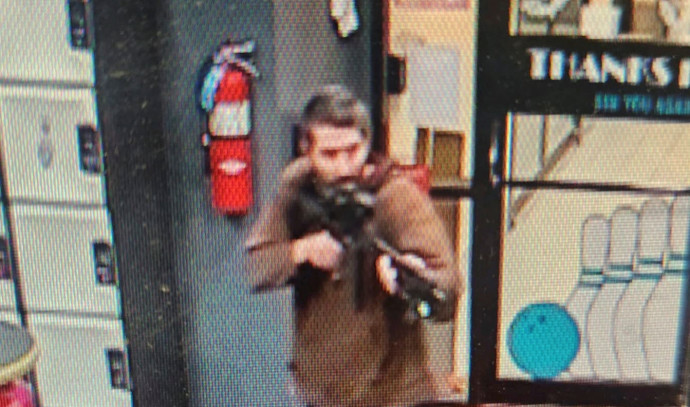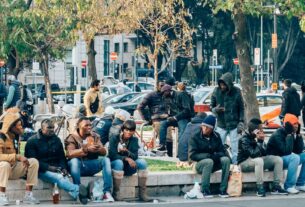A US Army reservist accused of spraying a bowling alley and bar with gunfire in Lewiston, Maine, killing 18 people, was found dead from a self-inflicted gunshot wound in a recycling plant trailer after a 48-hour manhunt, police said on Saturday.
The body of Robert R. Card, 40, was discovered on Friday night at a recycling plant in Lisbon Falls where he worked at one point, less than a mile from where police had found his abandoned getaway vehicle shortly after his shooting spree on Wednesday night.
A Maine State Police tactical team discovered Card’s body in an unlocked trailer in an overflow parking lot of the recycling plant, Maine Public Safety Commissioner Mike Sauschuck told reporters on Saturday.
Officers had cleared the plant twice in the course of their search, Sauschuck said, as they believed Card had some “employment relation” to the business, but had missed the extra parking lot, where about 60 box trailers full of crushed plastic and metal were parked, he said.
The body was found in an unlocked trailer, dressed in what appeared to be the same brown sweatshirt the suspect was wearing the night of the attack. Investigators would not comment on how long they believed it had been there.
Officials said they recovered a long rifle in Card’s abandoned white Subaru and two guns on his body, without confirming the makes and models. All the weapons were apparently purchased by Card legally, a representative for the Bureau of Alcohol, Tobacco, Firearms and Explosives said.
A total of 18 people were killed and 13 others were wounded in Wednesday night’s carnage, which began when the gunman opened fire with a rifle inside the Just-In-Time Recreation bowling alley, then launched another attack minutes later at Schemengees Bar & Grille Restaurant a few miles away.
Three people were still in critical condition, Sauschuck said on Saturday.
Motive investigation
Officials have not confirmed a possible motive for the violence, and were digging through cell phone records, following up on hundreds of tips and going through about a dozen search warrants this weekend to learn more, Sauschuck said.
Based on the investigation so far, Sauschuck said there was “a mental health component” to the tragedy. He said there was evidence Card was paranoid and “felt like people were talking about him,” which might have led him to target those specific venues.
A Maine law enforcement bulletin circulated earlier this week identified Card as a trained firearms instructor at the US Army Reserve base in Saco, Maine. It said he had been hearing voices and had other mental health issues.
He threatened to shoot up the National Guard base in Saco and was “reported to have been committed to mental health facility for two weeks during summer 2023 and subsequently released,” according to the bulletin from the Maine Information & Analysis Center, a unit of Maine State Police.
However, Sauschuck said on Saturday that officials had no evidence so far that Card had been “forcibly committed” for mental illness treatment, and were still looking into any voluntary treatment Card might have received.
Sauschuck said police found a note left at Card’s house, addressed to a loved one, which listed the passcode to his phone and bank account information.
“I wouldn’t describe it as an explicit suicide note, but the tone and tenor was that the individual was not going to be around,” he said.
The shootings and prolonged manhunt terrorized the normally bustling but serene community of Lewiston, a former textile hub and the second-most populous city in Maine. It lies on the banks of the Androscoggin River, about 35 miles (56 km) north of the state’s largest city, Portland.
Many business owners in Lewiston and adjacent communities closed shop in the immediate aftermath of the shooting, while authorities shuttered schools and ordered some 40,000 area residents to shelter in place as a precaution.
Within hours of Wednesday night’s bloodshed, police circulated surveillance camera photos from one of the crime scenes of a bearded man wearing a brown, hooded sweatshirt and jeans and carrying what appeared to be a semi-automatic rifle.
The initial trail of clues led to Lisbon, about 7 miles (11 km) to the southeast of Lewiston, where Maine State Police found a white SUV they believed Card had abandoned at a boat launch on the river. Lisbon Falls, where Card was found dead, is the next town along the river.
As part of their search for Card, police trawled the waters of the Androscoggin River with divers and sonar on Friday, and sent teams of officers door-to-door in neighborhood canvasses seeking additional clues and possible eyewitnesses.
The slain victims included four deaf people who had been competing in a beanbag-tossing tournament at the bar and grill, a father-and-son pair of bowlers, a part-time bowling alley worker who tried to confront the shooter with a knife, and an elderly couple aged 76 and 73.



